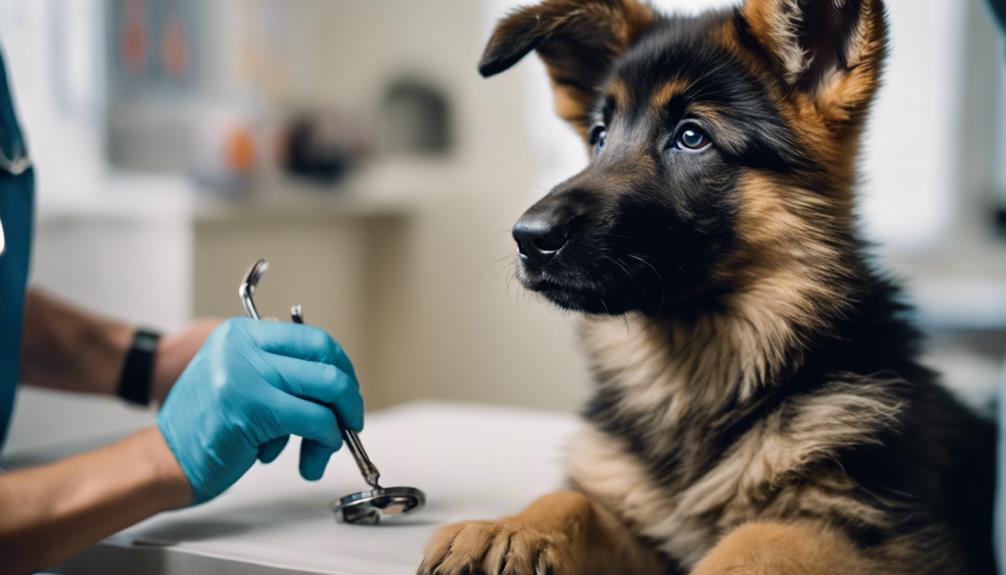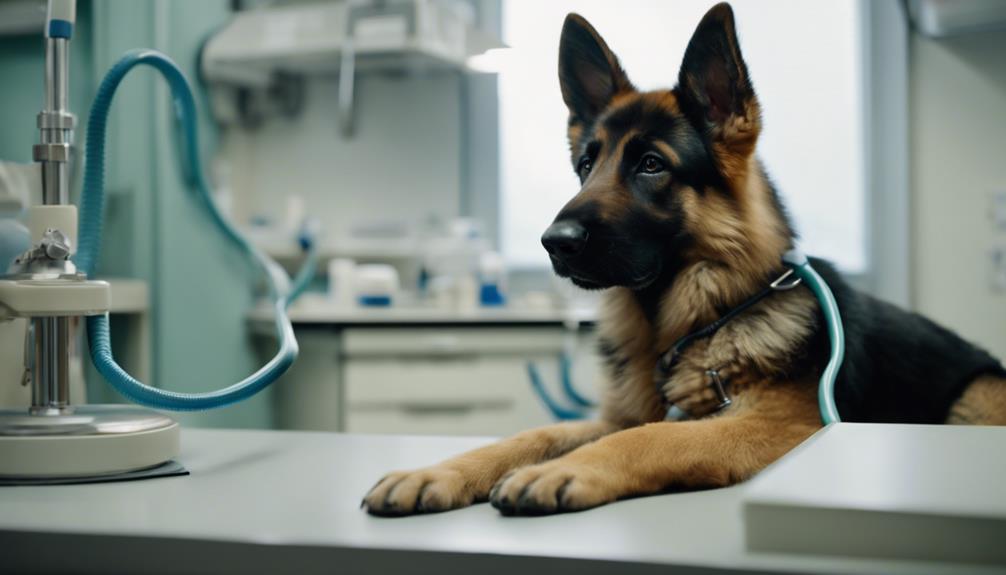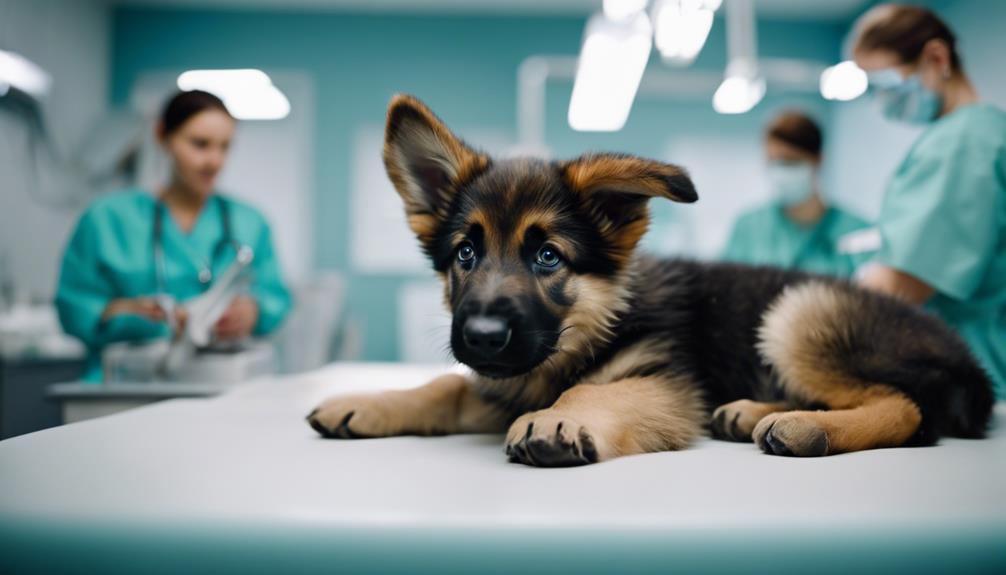🐾 Paw-some Partnership Alert! 🐾
As a pack of German Shepherd enthusiasts at MixGermanShepherd.com, we're always sniffing out the best products for our furry friends. Guess what? When you fetch something from Amazon through our links, we earn a little treat! 🦴
When it comes to your German Shepherd mix puppy, considering spaying or neutering is like planting seeds for a fruitful garden of health and behavior benefits. But before you make that decision, there are crucial factors to weigh. From the optimal timing for the procedure to understanding the potential risks involved, each choice impacts your furry companion's well-being in significant ways. So, before you take the next step, make sure you have all the information at your fingertips to make the best choice for your beloved pup's future.
Key Takeaways
- Spaying/neutering reduces cancer risks and ensures overall health.
- Wait until 1 year for surgery to prevent growth plate issues.
- Behavioral benefits include reduced aggression and balanced demeanor.
- Promotes responsible ownership, community impact, and ethical treatment.
Benefits of Spaying and Neutering

Spaying and neutering your German Shepherd mix puppy offers significant health benefits that can contribute to a longer and happier life for your pet. By spaying your female pup, you can reduce the risk of mammary cancer. This procedure eliminates the heat cycles, decreasing the chances of certain reproductive cancers as well. Neutering your male German Shepherd mix eliminates the risk of testicular cancer and can also reduce the likelihood of prostate disease and perianal tumors. Additionally, spaying and neutering can help prevent aggressive behavior and territorial marking in males, contributing to a more well-balanced and calm demeanor. These procedures not only benefit your pet's health but also help manage their behavior, making them more enjoyable companions. By reducing the risks associated with reproductive cancers and promoting overall well-being, spaying and neutering are essential steps in ensuring a healthier and happier life for your German Shepherd mix puppy.
Health Considerations for Spaying and Neutering

When considering spaying or neutering your German Shepherd mix puppy, it's essential to be aware of potential health considerations. Early spaying or neutering can impact bone development and joint health, potentially leading to increased risks of joint disorders like hip dysplasia. Understanding the individualized timing for these procedures can help mitigate the potential health complications, ensuring the well-being of your furry companion.
Surgery Risks for Pets
Consider the potential health risks associated with early spaying and neutering for your pets, including joint disorders, urinary incontinence, increased cancer risks, hypothyroidism, infectious diseases, and behavioral issues. Spaying German Shepherd Dogs before maturity can lead to a higher likelihood of joint disorders like CCL rupture and hip dysplasia. Female dogs spayed early may experience urinary incontinence issues. There is a correlation between early spaying/neutering and an increased risk of certain cancers. Additionally, neutering can be linked to a higher incidence of hypothyroidism and susceptibility to infectious diseases. Behavioral problems such as fearfulness and aggression have also been associated with early spaying/neutering in pets. Be mindful of these health effects when considering the timing of spaying or neutering your German Shepherd mix puppy.
Behavioral Changes After
To better understand the impact of spaying or neutering on your German Shepherd mix puppy's behavior, it is crucial to recognize the potential changes that may arise due to altered hormone levels. Neutering can help reduce the risk of certain hormone-related behaviors in both male and female dogs, leading to a more stable temperament. Here is a table summarizing the behavioral effects of spaying and neutering:
| Behavioral Effects | Description |
|---|---|
| Reduced Aggression | Neutering can help decrease aggressive tendencies in male dogs. |
| Decreased Marking | Spaying or neutering can reduce the urge to mark territory with urine. |
| Calmer Demeanor | Neutering can prevent territorial behavior in male dogs, resulting in a calmer disposition. |
| Stable Temperament | Spaying can decrease hormone-related behaviors in female dogs, promoting a stable demeanor. |
Behavioral Changes After Spaying or Neutering

After spaying or neutering your German Shepherd mix puppy, you may notice significant behavioral improvements such as reduced territorial behavior like marking and aggression in males. This change can lead to a more harmonious living environment and better interactions with other pets. Here are some behavioral changes you might observe after spaying or neutering your furry companion:
- Decreased Roaming Tendencies: Both male and female dogs tend to roam less after being spayed or neutered, reducing the risk of getting lost or encountering dangerous situations.
- Prevention of Dominance-Related Behaviors: Neutering can help prevent dominance-related behaviors in male German Shepherds, making training and socialization easier, leading to a more obedient and well-adjusted pet.
- Reduced Heat Cycles: Spaying your female German Shepherd can reduce the likelihood of heat cycles, which can affect their behavior and interactions with other dogs, promoting a calmer and more stable temperament.
These behavioral changes post-spaying or neutering can contribute to a more balanced and well-adjusted companion for your German Shepherd mix puppy, enhancing the bond between you and your furry friend.
Timing: When to Spay or Neuter

Spaying or neutering your German Shepherd mix puppy after they reach 1 year of age is crucial to prevent negative effects on their growth plates and reduce the risk of orthopedic issues. The growth plates in dogs typically close between 5-14 months, impacting their bone development. Early spaying or neutering can increase the risk of orthopedic issues in German Shepherd mix puppies. Waiting until the puppy is at least 1 year old can help reduce the chances of joint disorders and other health issues. It is important to consult with your veterinarian to determine the best timing for spaying your female German Shepherd or neutering your male German Shepherd. This decision should be based on a combination of factors including the breed, size, and individual health considerations of your puppy. By waiting until the appropriate age to spay or neuter, you can promote better bone development and overall health for your German Shepherd mix puppy.
Recovery Process for Spayed or Neutered Puppies

During your puppy's recovery from being spayed or neutered, it's crucial to follow post-operative care tips provided by your veterinarian. Monitor the incision site closely for any signs of infection and make sure to restrict your puppy's activity levels as advised. Supervise your puppy to prevent them from licking or chewing at the incision site to ensure a smooth healing process.
Post-Operative Care Tips
Upon bringing your spayed or neutered German Shepherd mix puppy home, it is crucial to create a calm and cozy environment to facilitate their post-operative recovery. Here are some essential post-operative care tips to help your furry friend heal effectively:
- Rest and Relaxation: Ensure your puppy has a quiet and comfortable space to rest without disturbance.
- Monitoring: Keep a close eye on the incision site for any signs of infection or complications.
- Follow Veterinarian's Instructions: Adhere to the medication schedule, feeding guidelines, and activity restrictions provided by your vet to aid in a smooth recovery process.
Monitoring Incision Site
After ensuring your spayed or neutered German Shepherd mix puppy has settled into a calm and comfortable environment for recovery, it is crucial to closely monitor the incision site to promote healing and prevent complications. Check the incision for any redness, swelling, discharge, or unusual odor, and keep it clean and dry to avoid infections. Make sure your puppy wears an Elizabethan collar to prevent licking or chewing at the incision. Follow the veterinarian's post-operative care instructions, including medication schedules and activity restrictions. If you notice any concerning changes in the incision site, such as excessive swelling or bleeding, contact your vet immediately. Proper monitoring of the incision site is vital for your puppy's successful recovery after spaying or neutering.
Activity Restrictions and Supervision
To aid in the recovery process of your spayed or neutered German Shepherd mix puppy, it is crucial to restrict strenuous activities like jumping or running for approximately 7-10 days. During this time, you should:
- Supervise Closely: Monitor your puppy to prevent them from engaging in activities that could strain their incision site.
- Avoid Rough Play: Discourage roughhousing with other dogs or vigorous play that may lead to post-surgery complications.
- Opt for Leash Walks: Take your puppy for controlled leash walks to ensure they don't overexert themselves and to promote a steady recovery.
Finding a Qualified Veterinarian for the Procedure

When seeking a qualified veterinarian for spaying or neutering your German Shepherd mix puppy, prioritize finding a professional experienced in performing these procedures on young puppies of similar breeds. Look for a vet who follows best practices for anesthesia, monitoring, and post-operative care to ensure the safety and well-being of your furry friend. It's crucial to check the veterinarian's track record of successful spaying/neutering surgeries in puppies like yours and confirm that they have the necessary surgical techniques and equipment suitable for smaller breeds such as German Shepherd mixes. Consider reaching out to other German Shepherd mix owners or seeking recommendations from breed-specific forums to find trusted veterinary professionals in your area.
| Key Points | Emotional Impact |
|---|---|
| Experienced in German Shepherd mixes | Assurance in the vet's expertise |
| Prioritizes safety and well-being | Comfort in your puppy's care |
| Positive track record in similar surgeries | Trust in the veterinarian's skills |
Cost Factors to Consider for Spaying and Neutering

When considering the spaying or neutering of your German Shepherd mix puppy, it is essential to carefully evaluate the cost factors involved in the procedure. Here are some key points to keep in mind:
- The cost of spaying a German Shepherd mix puppy can vary widely, ranging from $50 to $500. Factors such as location and veterinarian fees play a significant role in determining the final cost.
- Neutering a German Shepherd mix puppy may cost between $45 to $400. Additional charges for pre-surgical exams and pain medications should also be considered when budgeting for the procedure.
- Low-cost spay/neuter clinics or programs often offer discounted rates for German Shepherd mix puppies, making it a more affordable option for pet owners. Some animal shelters or rescue organizations may also provide spaying/neutering services at reduced costs or as part of adoption agreements.
Considering these cost factors can help you make an informed decision that ensures the well-being of your furry companion while being mindful of your budget.
Long-Term Impact on Your German Shepherd Mix

Early spaying or neutering of your German Shepherd mix puppy may impact their long-term health and predispose them to certain joint disorders and urinary incontinence. Neutering your puppy before the age of 1 can significantly increase the risk of joint disorders, such as hip dysplasia and cranial cruciate ligament tears. These conditions can cause pain, lameness, and reduced mobility in your German Shepherd mix as they age. On the other hand, spaying a female German Shepherd mix before the age of 1 may lead to a higher likelihood of urinary incontinence, a condition where your dog may have difficulty controlling their bladder.
It is crucial to consider the potential long-term consequences of early spaying or neutering on your German Shepherd mix's health. Consulting with a veterinarian can help you make an informed decision based on your puppy's individual needs and breed-specific health risks. By carefully weighing the risks and benefits, you can ensure the best possible outcome for your furry companion's well-being in the long run.
Spaying Vs. Neutering: Key Differences

Spaying and neutering are essential procedures for controlling pet population and improving the health outcomes of your furry companions. Here are the key differences between spaying and neutering:
- Spaying:
- Involves removing a female dog's ovaries and uterus.
- Prevents pregnancy and heat cycles.
- Eliminates the risk of uterine infections and reduces the likelihood of mammary tumors in female dogs.
- Neutering:
- Involves removing a male dog's testicles.
- Prevents reproduction and reduces certain behaviors.
- Reduces the risk of testicular cancer and can help prevent aggressive behavior and marking in male dogs.
Spaying and neutering are common procedures recommended by veterinarians. Spaying not only prevents unwanted litters but also significantly reduces the risk of mammary tumors in female dogs. Neutering, on the other hand, can help control aggressive behaviors and prevent testicular cancer in male dogs. Both procedures play a crucial role in ensuring the well-being of your German Shepherd mix puppy.
Responsible Pet Ownership and Spaying/Neutering
When considering the importance of spaying or neutering your German Shepherd mix puppy, remember that these procedures not only benefit your pet's health but also play a crucial role in controlling pet overpopulation. By responsibly choosing to spay or neuter your puppy, you contribute to efforts aimed at reducing the number of dogs in shelters. Additionally, these procedures can help prevent certain illnesses and promote a longer, healthier life for your furry companion.
Importance of Spaying/Neutering
Ensuring responsible pet ownership includes spaying or neutering your German Shepherd mix puppy to prevent unwanted litters and promote overall health. Here are three key reasons highlighting the importance of spaying or neutering your puppy:
- Population Control: Spaying or neutering helps prevent overpopulation of pets, reducing the number of animals in shelters.
- Health Benefits: These procedures can lower the risk of certain health issues such as certain cancers and infections.
- Behavioral Improvement: Spaying or neutering can help reduce aggressive behaviors and roaming tendencies in your German Shepherd mix puppy.
Health Benefits for Pets
Promoting responsible pet ownership involves considering the health benefits associated with spaying or neutering your German Shepherd mix puppy. These procedures not only prevent unwanted litters but also have significant health advantages. Take a look at the table below to understand the health benefits for your furry companion:
| Health Benefits of Spaying/Neutering | Description |
|---|---|
| Decreased risk of reproductive cancers and infections | Reduces chances of serious health issues |
| Manages aggressive behaviors in male dogs | Helps in controlling unwanted behavior |
| Eliminates heat cycles and reduces mammary cancer risk | Improves overall health and well-being of your puppy |
Overpopulation Control Efforts
To effectively address overpopulation and promote responsible pet ownership, spaying and neutering your German Shepherd mix is a crucial step in ensuring a healthier future for both your pet and the animal community. Here are three reasons why spaying/neutering is vital for overpopulation control efforts:
- Preventing Unwanted Litters: Spaying/neutering your German Shepherd mix helps prevent the birth of unwanted puppies, reducing the number of animals entering shelters.
- Reducing Euthanasia Rates: By controlling the pet population through spaying/neutering, you contribute to lowering the euthanasia rates of millions of animals each year.
- Supporting Ethical Breeding Practices: Promoting spaying/neutering for German Shepherd mixes encourages responsible pet ownership and aids in alleviating the burden on animal shelters and rescues.
Frequently Asked Questions
Will My Female German Shepherd Calm Down After Being Spayed?
After being spayed, your female German Shepherd may exhibit behavior changes, becoming calmer and less prone to heat-related behaviors. This can contribute to a more manageable temperament and reduced roaming tendencies, enhancing your bond.
Will Neutering My German Shepherd Make Him Less Aggressive?
When you neuter your German Shepherd, you can expect behavioral changes like reduced aggression. Hormonal effects help balance temperament. Seek training tips for behavior modification. Consulting a vet tailored to your pup's needs is key.
Do German Shepherds Change After Neutering?
After neutering, German Shepherds may experience changes in behavior. Training can help adapt to these changes. Positive reinforcement and consistency are key in guiding your dog through this transition, ensuring a smooth adjustment period.
Can Both Male and Female Dogs Be Neutered?
Yes, both male and female dogs can be neutered. Neutering involves removing reproductive organs, benefiting dogs by preventing overpopulation, reducing health risks, and managing behavior. It's a common practice to promote responsible pet ownership and well-being.
Conclusion
In conclusion, spaying and neutering your German Shepherd mix puppy can provide plentiful perks, from preventing overpopulation to promoting overall health. Remember, responsible pet ownership involves making informed decisions for the well-being of your furry friend. Consider consulting with a trusted veterinarian to determine the best timing for this procedure, ensuring a smooth and successful recovery. Take the time to weigh the costs and benefits, ultimately leading to a happier and healthier life for your beloved buddy.
